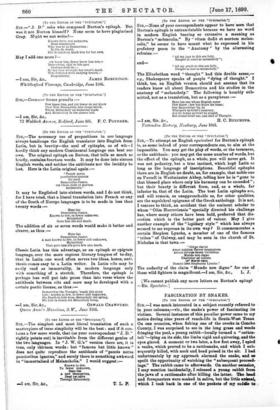[To THE EDITOR OF THE "SPECTATOR.1 SIR, —The necessary use of
prepositions in our language always handicaps the English translator into English from Latin, but in brevity—the soul of epitaphs, as of wit—I hardly think any modern Continental language can beat our own. The original epitaph on Burton, that tells so much so briefly, contains fourteen words. It may be done into sixteen English words, and neither the antithesis nor the lucidity be lost. Here is the Latin original again :— " Pawls notes paucloribus ignotus Ille jacet Democritus Junior, cut vitam dedit et mortem tuelancolia."
It may be Englished into sixteen words, and I do not think, for I have tried, that a literal translation into French or any of the South of Europe languages is to be made in less than
twenty words:—
Here lies Democritus Junior, Enown to few, to fewer unknown.
Melancholy Gave him life and death.
The addition of six or seven words would make it better and clearer, as thus :—
Here Iles Democritus Junior, A man known to few, to fewer still unknown, Melancholy That gave him life gave him also death.
Classic Latin has this advantage, as an epitaph or epigram language, over the more copious literary tongues of to-day, that in Latin one word often serves two ideas, hence, anti- thesis comes easy to a Latin writer. In Latin vita may be easily read as immortality, in modern language only with something of a stretch. Therefore, the epitaph is perhaps less well put into prose than into verse where the antithesis between vita and mars may be developed with a certain poetic license, as thus:— De:noel-1ms the Younger, 'neath this stone Lies ; known to few, to fewer still unknown, His Death-in-Life from Melancholy did spring, His Life-in-Death did Melancholy bring.
Queen Anne's Mansions, S.W., June 13th.






































 Previous page
Previous page